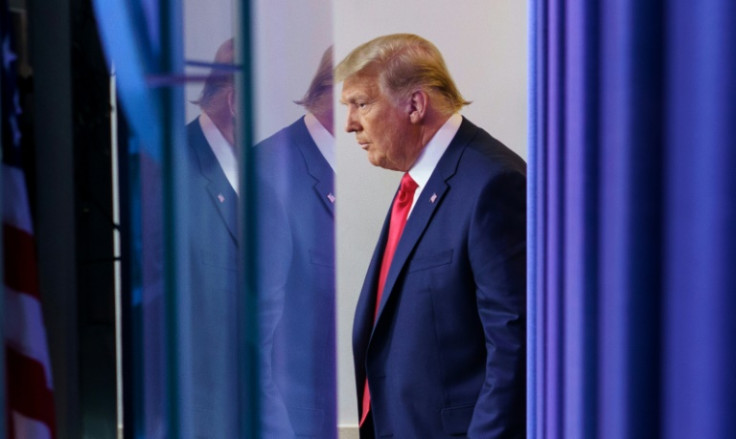Georgia Indictment Raises New Dangers For Trump

Donald Trump has been indicted four times this year but the latest charges -- in Georgia -- may carry particular peril for the former president.
The Georgia case is the only trial likely to be televised, with the historic proceedings streamed and broadcast into households across the United States and around the world.
The billionaire real estate tycoon starred for 14 seasons in the reality television show "The Apprentice," but he will be in a far different role when the case eventually comes to trial -- that of criminal defendant.
Fani Willis, the Georgia district attorney who charged Trump and 18 others with racketeering and other offenses related to their efforts to overturn the 2020 election, said Monday she wants to hold the trial within the next six months.
Trump also faces federal charges brought by special counsel Jack Smith for allegedly conspiring to defraud the United States with his attempts to upend the election he lost to Democrat Joe Biden.
A judge is to set a date on August 28 for a trial in the nation's capital -- but television cameras are not allowed in federal courtrooms.
Smith has asked for the trial to begin on January 2, 2024, nearly three years to the day after Trump supporters stormed the US Capitol in a final bid to prevent Congress from certifying Biden's victory.
The special counsel has also accused Trump, the frontrunner for the 2024 Republican presidential nomination, of mishandling top secret government documents in a case set to go to trial in Florida in May 2024.
Trump also faces a state trial in New York in March 2024 for allegedly paying election-eve hush money to a porn star, but those charges pale in severity to the accusations in Georgia.
The 77-year-old Trump is accused in Georgia of trying to overturn the results of the election in the southern state, where he lost to Biden by less than 12,000 votes.
In a call to Georgia election officials, Trump was recorded asking them to "find 11,780 votes" -- the exact number he would need to upend Biden's victory.
Trump and the other defendants in the Georgia case, who include Mark Meadows, his former White House chief of staff, and his personal lawyer Rudy Giuliani, are charged with racketeering, a charge that does not figure in the other criminal prosecutions.
"Willis ties them all together by levying one charge against Mr. Trump and each of the 18 other defendants under Georgia's Racketeer Influenced and Corrupt Organization Act, or RICO, accusing Mr. Trump and his co-conspirators of functioning as a criminal gang," attorneys Norman Eisen and Amy Lee Copland said in a column in The New York Times.
The Georgia indictment is the "first to plumb the full depths, through a state-focused bathyscaph, of the conspiracy" to upend the 2020 election, they said.
"That all of this is likely to play out on television only deepens the historic nature of the indictment."
A conviction for racketeering -- typically used to target organized crime -- carries a minimum sentence of five years in prison.
Trump has pleaded not guilty to the New York and federal charges, and has accused his Democratic political opponents of bringing them to derail his bid to recapture the White House.
As for a pardon, the New York and Georgia indictments both involve state charges, not federal ones, and Trump would not be able to pardon himself if he does manage to win the election next year.
A US president can only issue pardons for federal crimes, not state convictions.
In Georgia, pardons are granted by a five-member Board of Pardons and Paroles, not by the governor as in many other states.
An offender can only apply for a pardon, however, at least five years after completing their prison sentence and they must have "lived a law-abiding life" since their release.
© Copyright AFP {{Year}}. All rights reserved.





















